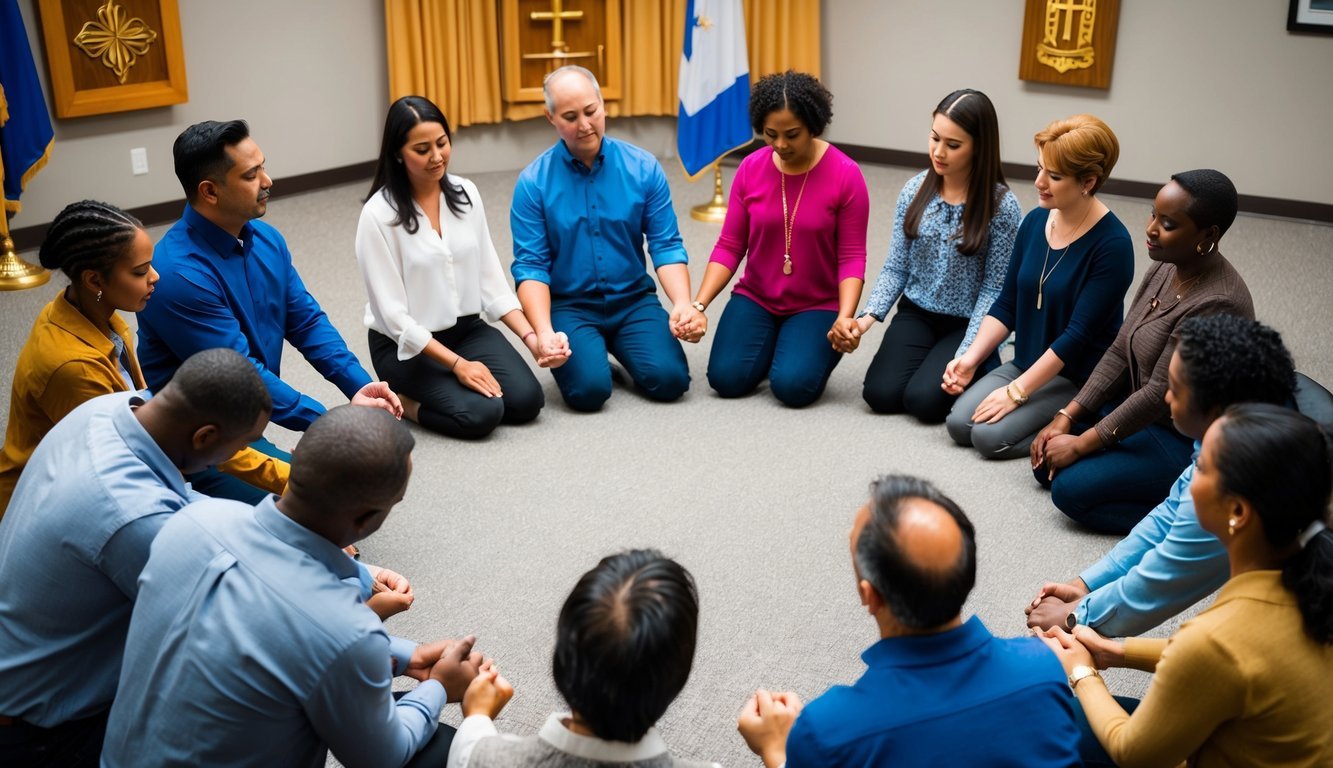PsychNewsDaily Publishers
100 Summit Drive
Burlington, MA, 01803
Telephone: (320) 349-2484
PsychNewsDaily Publishers
100 Summit Drive
Burlington, MA, 01803
Telephone: (320) 349-2484
Christian spirituality fosters a deep, transformative relationship with God, emphasizing prayer, love, community, and personal growth through scripture and spiritual practices.

Christian spirituality isn’t just a religious practice—it’s a living, breathing relationship with God that shapes every part of our lives. It goes beyond just church attendance or memorizing Bible verses to a deep inner connection that transforms us from the inside out.
When we talk about Christian spirituality, I think we’re really talking about a journey of the heart. It’s not just about knowing things about God, but actually knowing God Himself. I’ve found that true spirituality starts with recognizing that God wants a genuine relationship with us.
This relationship isn’t based on rigid rules, but on love and truth. The Bible talks about being transformed by the renewing of our minds, and honestly, it makes me think about how my own spiritual journey has been less about checking boxes and more about growing in love.
At its core, Christian spirituality involves both our inner life and how we live outwardly. It’s about becoming more like Jesus through the power of the Holy Spirit. Some days I feel this connection strongly, other days it’s harder to grasp.
Prayer is kinda like the heartbeat of Christian spirituality. It’s not just asking for stuff—it’s having an actual conversation with the Creator of everything! I’ve learned that prayer is as much about listening as it is about talking.
When I first started praying regularly, it felt awkward, like I was just saying words to the ceiling. But over time, it became more natural, more like talking to a friend who happens to be the wisest person ever.
The Bible shows different kinds of prayer—praising God, thanking Him, asking for help, or just being quiet in His presence. Jesus himself prayed all the time, showing us how important it is. I’ve found that starting small with just a few minutes each day has made a huge difference in my spiritual life.
In Christian spirituality, Jesus isn’t just a historical figure or a good teacher—He’s literally the center of everything. I can’t overstate how crucial Jesus is to our spiritual growth. He’s not just someone we learn about; He’s someone we relate to.
The Christian tradition teaches that Jesus provides the perfect example of what a spirit-filled life looks like. When I’m struggling with how to respond to difficult situations, I often ask myself, “What would Jesus do?” It sounds simple, but it’s surprisingly effective!
Jesus also gives us direct access to God. The Bible says the curtain in the temple was torn when Jesus died, which I think is a beautiful picture of how we can now approach God directly because of what Jesus did. Through His life, death, and resurrection, Jesus made it possible for us to have the Holy Spirit living inside us, guiding and transforming us daily.

The Bible serves as a foundational tool for our spiritual journey, offering guidance and wisdom that transforms us from the inside out. Scripture reading works hand-in-hand with spiritual disciplines to create pathways for authentic growth in our Christian lives.
I’ve found that the Bible isn’t just some old book—it’s actually alive and active in my life! When I spend time with the Holy Scriptures, I notice my spiritual life getting deeper.
One approach I love is called lectio divina, which means “divine reading.” It’s about slowly reading scripture, letting it sink in rather than rushing through. Honestly, it makes me think of savoring a delicious meal instead of gobbling it down.
The Psalms are my go-to when I’m feeling lost. They’re like a spiritual mirror—showing me all the human emotions God understands. I remember when Psalm 23 spoke to me during a tough time, and wow, what comfort!
New Testament passages like John 15 (about the vine and branches) have taught me that staying connected to the Word of God isn’t optional—it’s essential for bearing spiritual fruit.
I’ve learned that just knowing scripture isn’t enough—we gotta practice it too! Spiritual growth happens when we combine Bible study with other practices that stretch our faith.
Prayer is my lifeline. Some days my prayers are messy and distracted, but I keep showing up. I’ve tried different types:
Fasting has been a game-changer for me too. Going without food for a bit makes me more aware of my spiritual hunger. I wonder if that’s why Jesus did it so often?
The Holy Spirit works through these disciplines, transforming our knowledge into wisdom. When I regularly practice Scripture meditation, service, and worship, I notice my character changing—becoming more like Christ’s. That’s the whole point!

Christian spirituality isn’t meant to be a solo journey. It thrives when we connect with others and put our faith into action. The interplay between being together and doing together forms the heartbeat of authentic spiritual growth.
I’ve always thought that community is where faith gets real. When we gather with other believers, we create this amazing space where spiritual fellowship can flourish. It’s like the early church in Acts – they didn’t just believe the same stuff, they shared their lives.
The Body of Christ isn’t just a nice metaphor. It’s how we’re supposed to function! When I’m struggling, someone else is strong. When I’m confused, someone else has clarity. That’s why regular church attendance isn’t just about showing up – it’s about being present for each other.
Fellowship goes deeper than coffee after service (though I do love those donuts!). True Christian fellowship means being vulnerable enough to say “I’m not okay” and brave enough to hear it from others. In our individualistic culture, this kind of togetherness is revolutionary.
Putting faith into practice is where the rubber meets the road. I’ve noticed that community formation happens most powerfully when we serve together. Whether it’s feeding the hungry or advocating for justice, shared action builds spiritual muscles.
But we don’t just do stuff together. We reflect on it too! After a service project, the conversations that happen often reveal God’s presence in unexpected ways. These moments of shared spiritual practice deepen our discipleship in ways solo Bible study never could.
Christian action isn’t about earning God’s love – we already have that. It’s about bringing heaven to earth, bit by bit. When we work alongside others, especially in ecumenical settings with believers from different traditions, we get this incredible glimpse of God’s diverse family.

The spiritual journey ain’t always easy. We all gotta deal with our human flaws while trying to find healing and forgiveness through God’s amazing grace.
I think one of the hardest things about being a Christian is looking at ourselves honestly. Sin isn’t just breaking rules—it’s that deep disconnect between who we are and who God made us to be. When I reflect on my own life, I see how sin has created barriers between me and others.
The good news? Redemption is real! I’ve seen it happen in my own heart. The Christian understanding of redemption carries definitional difficulties, but at its core, it’s about being rescued from our broken state.
Sometimes I wonder if we focus too much on shame and not enough on the promise. Jesus didn’t just point out sin—he offered a way forward. This is what makes Christianity different from just a set of moral guidelines.
Human struggles with spiritual insecurity are normal, but the promise of redemption gives us hope. It’s not about being perfect tomorrow—it’s about taking small steps toward healing today.
Grace is that undeserved gift that keeps surprising me. When I’m having my worst days, that’s when God’s grace seems to show up strongest. It’s like getting a present you know you didn’t earn.
In my experience, grace isn’t just a theological concept—it’s practical. When someone forgives me when I don’t deserve it, that’s grace in action. When I can extend kindness to someone who’s hurt me, the fruit of the Spirit like patience and kindness are growing in me.
Galatians 5:22-23 talks about love, joy, peace and all that good stuff. I’ve found these qualities don’t just appear—they develop gradually as we practice living in grace.
Honestly, it makes me think about how we’re called to extend this same grace to others. In our divided world, imagine what could happen if Christians became known for radical grace rather than judgment? That’s the challenge I’m trying to live up to, even when it’s hard.

The intersection of mystical experience and scholarly study creates a fascinating landscape within Christian spirituality. These approaches offer different yet complementary pathways to understanding our relationship with the divine.
Mysticism in Christianity is really about that direct, personal connection with God. I’ve always found it interesting how mystics describe these profound moments – they’re often beyond words!
Christian mysticism has this rich tradition dating back centuries, where people experience God in ways that feel immediate and transformative.
Karl Rahner once suggested that Christians of the future will essentially be mystics or they won’t exist at all. Honestly, it makes me think about how important personal spiritual experiences are becoming in our modern world.
Some mystical practices include contemplative prayer, meditation on scripture, and what’s sometimes called “the dark night of the soul.” These aren’t just ancient concepts – they’re still relevant for believers seeking deeper faith today.
Mystical approaches often emphasize direct knowing over intellectual understanding. I wonder if that’s why they’re gaining popularity as people search for authenticity in their spiritual lives?
The study of Christian spirituality has blossomed into a proper academic discipline in recent decades. We’re seeing universities create whole programs dedicated to analyzing spiritual traditions through various lenses – theological, historical, psychological, and more.
Scholars approach spirituality through interdisciplinary methods that combine theology with psychology, sociology, and anthropology. They’re looking at historical texts, practices, and beliefs to understand how spirituality has evolved.
What I find particularly fascinating is how academics examine distinctive forms of spirituality across different groups – like women’s spiritual experiences throughout Christian history.
There’s sometimes tension between personal spiritual experience and academic analysis. But at their best, these approaches complement each other. The academic study helps us contextualize and understand spirituality while honoring the authentic experiences at its core.

Christian spirituality can be tricky to understand sometimes, with so many perspectives and practices across different traditions. People often come to the study of spirituality with personal questions that matter deeply in their lives. Let me try to answer some common questions I get about this journey.
I think of religion as the formal structure – the church buildings, official doctrines, and organized practices. Spirituality is more about the personal relationship and connection with God. They’re different but related, kinda like how a trellis supports a vine.
In Christianity, religion provides the framework of beliefs and traditions, while spirituality is how we experience and live those beliefs in our hearts. Many students are drawn to study Christian spirituality because they want to deepen this personal dimension.
Religion without spirituality can feel empty and rigid. Spirituality without religion might lack direction or community. The best approach, I’ve found, combines both – using tradition to guide our personal spiritual growth.
Different Christian traditions offer unique ways to connect with God that affect our everyday lives. Catholic spirituality might emphasize sacraments and structured prayer, while Protestant approaches might focus more on Scripture study and direct connection with God.
I’ve noticed how common prayer and spiritual practices can transform ordinary moments into sacred ones. When I practice centering prayer before my morning coffee, my whole day feels different – more grounded and peaceful.
Some folks connect through serving others, finding God in acts of compassion. Others might experience spiritual growth through quiet contemplation or worship music. The expression that speaks to you will naturally shape your priorities, relationships, and daily choices.
I think Jesus’ teachings point to a spirituality that’s deeply authentic and practical. He didn’t separate spiritual life from everyday actions – loving neighbors, showing mercy, pursuing justice.
When I look at the Gospels, I see Jesus modeling a spirituality that balances personal prayer with public engagement. He withdrew to quiet places but also shared meals with all kinds of people. This balance seems key.
Many students of spirituality are asking these same “big questions” about living authentically. I believe Jesus-aligned spirituality embraces both contemplation and action, personal transformation and community involvement.
A fulfilling Christian spiritual life isn’t one-size-fits-all, but I think it has some common elements – a sense of purpose, meaningful connection with God and others, and growth through both joy and struggle.
It’s about finding sacred moments in ordinary days. When I notice the beauty of nature or feel compassion for a stranger, those are spiritual experiences that bring fulfillment. Ronald Rolheiser calls this “holy longing” – that deep desire for God that drives our spiritual journey.
A spiritually fulfilling life also includes community – people who share our values and support our growth. And it usually involves service, using our gifts to make the world more loving and just.
At its heart, Christian spirituality is about a relationship with God through Jesus. It starts with belief that God loves us and wants connection with us. This relationship transforms how we see ourselves and others.
Prayer is central – talking and listening to God in different ways. This might be structured prayers, spontaneous conversation, or quiet listening. Scripture reading helps us understand God’s character and will.
Love is the biggest principle – love for God and others. Jesus said these were the most important commandments. Christian spirituality means growing in our capacity to love well, even when it’s difficult.
Community matters too. We weren’t meant to practice faith alone. Sharing the journey with others provides support, accountability, and different perspectives on God.
Deeper connection with God often happens in quiet moments of prayer or meditation. Some Christians practice centering prayer. They sit quietly and use a sacred word to focus their attention on God’s presence.
Studies show many patients value discussing spirituality as part of their overall wellbeing. This makes sense to me. Spiritual connection affects our whole lives, including our health and relationships.
Spiritual practices like fasting, serving others, or spending time in nature can create space for deeper awareness of God. I’ve found journaling helps me notice patterns in my spiritual life and moments where God seemed especially close.
Sometimes, difficult times force us to depend on God. Other times, moments of overwhelming gratitude or joy help us connect with God. The key is being intentional about making space for God in daily life.